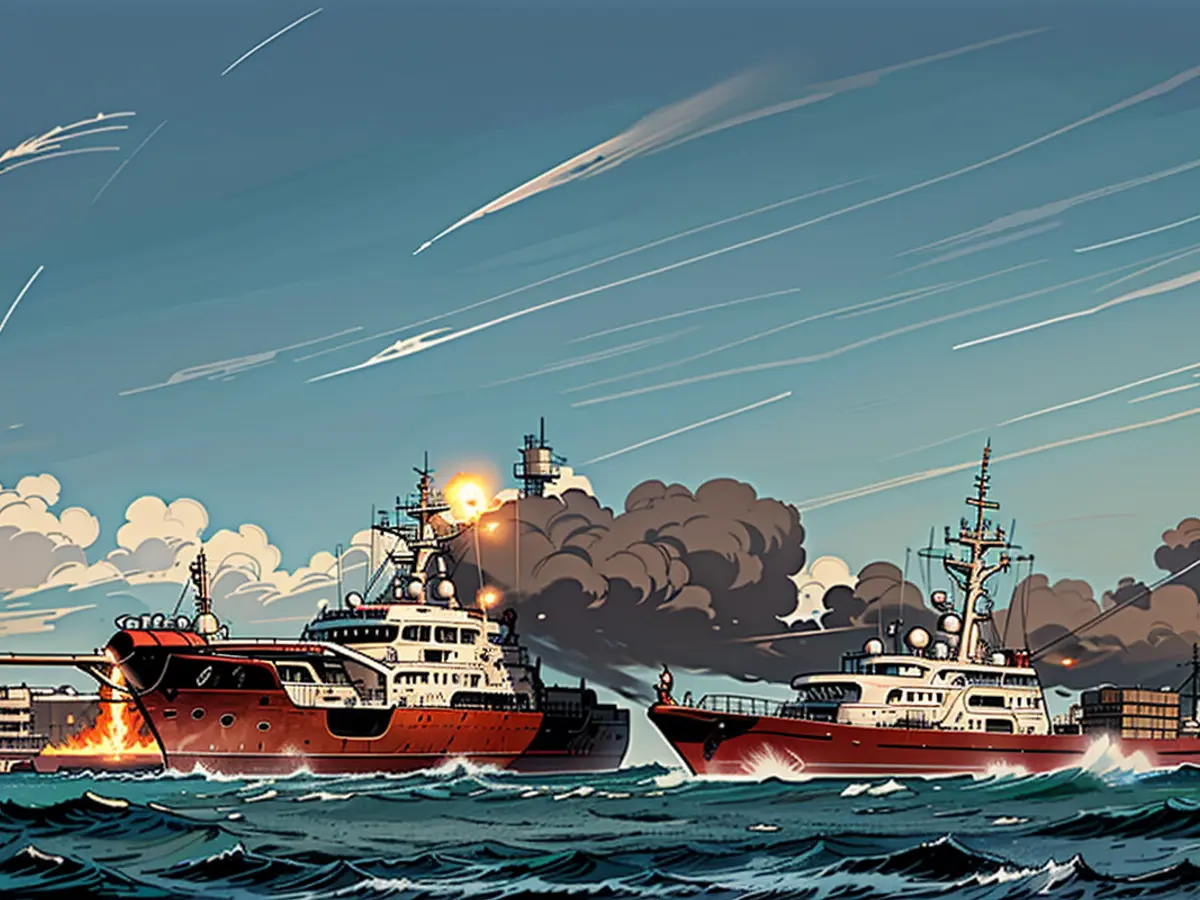Straying fuel tanker ignites in Rostock.
A few kilometers from Heiligendamm, a tanker named "Annika" burst into flames. Swiftly, emergency services and firefighters raced to the site, extinguishing the flames after numerous hours of tireless work. The vessel was subsequently towed to Rostock, where the firefighting efforts were expected to continue.
This significant event took place on the bustling Baltic Sea, which lies between Germany and Denmark. After the flames in the ship's rear compartment were subdued, the tanker was moved to Rostock around midnight, eventually reaching the harbor's anchoring spots. It is here that the fire was to be finally extinguished.
The 73-meter long and 12-meter wide vessel, "Annika," was transporting approximately 640 tons of oil from Rostock to Travemünde. During the incident, the burning ship was anchored approximately 4.5 kilometers off Heiligendamm. Despite intensive investigations, the fire's root cause remains unidentified, with the first reports of the incident arriving at 9:00 a.m.
The German Maritime Search and Rescue Service품 secured the safety of the seven crew members and transported them ashore. Mild injuries were reported among a few individuals, as per the incident command. Firefighters battled the blaze from three ships, employing a rescue helicopter to reach the ship by early afternoon. After their on-board inspection, the course of action was discussed. Local authorities put up a 3-nautical-mile safety zone around the site.
Photographs depicted large quantities of water being sprayed onto the tanker from rescue ships. The rear of the vessel emitted copious amounts of black smoke, emanating from the engine room and bridge.
Coastal viewers witness the fire
The incident transpired within view of the heavily tourist-oriented coastline between Warnemünde and Kühlungsborn. Martin Delpiano-Weber, a guest at Heiligendamm's hotel with his spouse, recounted observing the ship in the morning. He described the sight as a "fire wall or flame" that was being extinguished at the same time.
Tobias Woitendorf, the head of Mecklenburg-Vorpommern's state tourism association, voiced shock. "This is a situation we always panic about in the tourism industry," he said. "We experience heavy traffic here." The fire on the nearby coastal tanker serves as a major incident with potential severe consequences. Mecklenburg-Vorpommern's Environment Minister, Till Backhaus, described the evolving situation as "extremely dynamic." "We'll do everything in our power to prevent major environmental damage," he vowed.
The environmental organization WWF commended the swift response of the rescue and firefighting teams. The incident command north demonstrated its expertise, remarked the WWF Baltic Office's director in Stralsund, Finn Viehberg. He emphasized the demand for a dense incident command network spanning the entire Baltic Sea, likening the current situation to instances when dangerous goods ships are transported without such a network.
Oliver Zielinski, the director of the Leibniz Institute for Baltic Sea Research in Warnemuende, expressed grave concern about the fire. "This is a ship carrying 640 tons of heavy oil only a few kilometers off the coast," he said. "In the worst-case scenario, it could be driven into a highly sensitive coastal ecosystem." Zielinski warned that "640 tons: that's a massive amount of heavy oil and could cause substantial environmental damage." He hoped that such damage would be averted. "Countermeasures are already in operation."
Schleswig-Holstein's Environment Minister, Tobias Goldschmidt of the Greens, pointed out the growing threat of an oil catastrophe. "This burning tanker once again highlights the significant danger to the marine environment posed by the escalating tanker traffic in the Baltic Sea," he said. In particular, the increase in old and underinsured Russian oil tankers from the so-called shadow fleet, which do not protect against incidents of this nature, was worrying, Goldschmidt added.
The Baltic Sea is the world's most heavily trafficked sea. According to Viehberg, nearly 2,000 large ships sail its waters daily, with some carrying up to 100,000 tons of cargo. The incident off Heiligendamm served as a "wake-up call," said the scientist.
The Commission, in this context, referred to the incident command overseeing the firefighting efforts and rescue operations. The Member States referred to the various nations contributing resources and expertise to aid the Commission.
Following the incident, the Commission requested additional support from the Member States to enhance their response and mitigate potential environmental damage.






